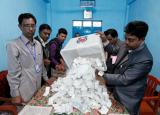Dhaka, Jan 5: Polling for the 10th parliamentary elections ended in 147 constituencies in 59 districts of Bangladesh amid an opposition-led string of violent incidents Sunday.
Counting of votes began shortly after balloting ended at 4 p.m.

"Voting at 160 polling centres in 21 constituencies has so far been postponed," the official said.
He said there were incidents of snatching and torching of ballot papers and boxes in some polling centres.
Around 13 people were killed in several attacks on polling centres and clashes in eight districts after balloting began Sunday, bdnews24.com reported.
Four other people were killed earlier in poll-related violence between Saturday night and early Sunday morning.
Polling across the country closed at 4 p.m., the report quoted Election Commission Deputy Secretary Mihir Sarowar as saying.
"However, those who reached polling centres by 4 p.m. will be able to cast their votes," he added.
The Election Commission is yet to reveal the voter turnout figures.
"Voter turnout will be low because some parties are not contesting," Chief Election Commissioner Rakibuddin Ahmed said.
The election commissioner said the polls had been fair.
Voting in the parliamentary polls began at 8 a.m. Sunday amid a series of violent incidents.Explosions occurred outside two polling stations in Dhaka, injuring at least five people.
Mired in controversy, the parliamentary elections were held in just 147 out of 300 seats in 59 out of 64 districts of the country. As many as 153 candidates have already been elected unopposed amid a boycott by the main opposition party and its allies.
Some 21 parties, including former prime minister Khaleda Zia's Bangladesh Nationalist Party, boycotted the polls over Prime Minister Sheikh Hasina's refusal to introduce a non-party interim government to oversee the elections.





Comments
Add new comment